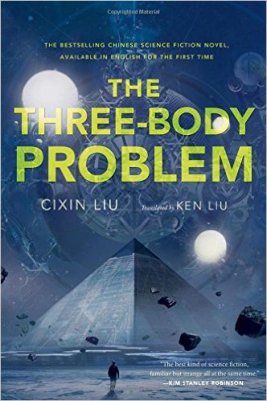Personal kerfuffle in my life still has not settled, and so there was little time for reading and writing, and even things like Twitter and other social interaction have fallen by the wayside. I need this month to be over, out like a lamb or however it would like to go.
I have re-read Sarah Vowell’s Lafayette in the Somewhat United States. Rather, I re-listened to it, because her audiobooks are narrated by herself and a crew of various star guests (like Nick Offerman as George Washington), which makes them more like audio play productions. It is excellent.
 Other reads were on the speculative fiction side, the first one being Third Body Problem by Cixin Liu, translated by Ken Liu. It got a lot of buzz and love last year, but it happened during the time when I briefly fell out of love with hard sci-fi. Third Body Problem reads like science fiction from the Golden Age, eager to cram all of the science and ideas inside. It reads stilted, emotions plainly explained, all character motivations delineated, everything over-described. And therein lies my beef with Third Body Problem. It’s not that I need a pure ‘show don’t tell’ approach, but I need my science fiction to be more of a novel and less of a guidebook. I don’t think it’s translation. Perhaps this is just Cixin Liu’s style. Sadly, I will never know, Chinese being one of languages I am not going to master in this lifetime.
Other reads were on the speculative fiction side, the first one being Third Body Problem by Cixin Liu, translated by Ken Liu. It got a lot of buzz and love last year, but it happened during the time when I briefly fell out of love with hard sci-fi. Third Body Problem reads like science fiction from the Golden Age, eager to cram all of the science and ideas inside. It reads stilted, emotions plainly explained, all character motivations delineated, everything over-described. And therein lies my beef with Third Body Problem. It’s not that I need a pure ‘show don’t tell’ approach, but I need my science fiction to be more of a novel and less of a guidebook. I don’t think it’s translation. Perhaps this is just Cixin Liu’s style. Sadly, I will never know, Chinese being one of languages I am not going to master in this lifetime.
And yet it is not a terrible book. In fact, it is rather smart in its ideas and connections. I wanted to keep reading despite being annoyed by the style, and I do not regret finishing it (that’s the kind of blurb you want for your novel, ‘did not regret finishing’). I might even read the second one (The Dark Forest), if only to see how different it is with a different translator.
And now I am off to finish Rob Spillman’s memoir, All Tomorrow’s Parties, a book that feels familiar even though his life is quite different from mine. Next after that, Joe Hill’s Fireman, out in May. Quite excited about this one.


